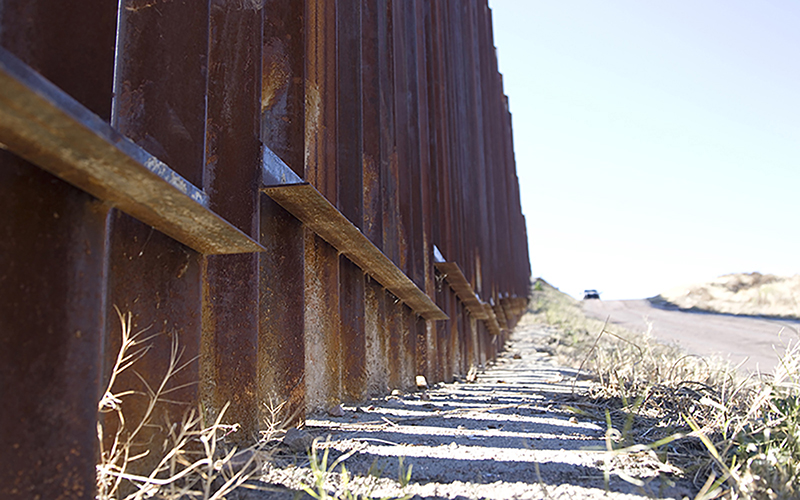
A stretch of U.S.-Mexico border wall near Nogales. Latino groups are criticizing Hispanic-owned firms that have expressed an interest in bidding on a Trump administration plan to extend the wall the length of the Southwestern border, but the companies are unfazed. (Photo by Josh Orcutt/Cronkite News)
WASHINGTON – Some Hispanic-owned companies on the list of “interested vendors” for the construction of a U.S.-Mexico border wall say they are facing a backlash from Latino advocates who call the project “shameful” and “wrong.”
Even though the contracts could be worth billions – estimates range from $21.6 billion to as much as $70 billion – advocates say contractors should pass on the job if it means helping construct a wall that “represents racism” and divides families across the border.
“There are certain things morally that we shouldn’t accept. This is one of them,” said Lydia Camarillo, vice president of the Southwest Voter Registration Education Project.
That reaction did not surprise James Garcia, a spokesman for the Arizona Hispanic Chamber of Commerce, which officially opposes the wall but takes no position on whether contractors should bid on it.
“It’s probably safe to say that it’s not going to be received favorably in the immigrants’ rights community,” Garcia said of the wall project.
A total of 308 companies, including 22 from Arizona, made the early April deadline to be included on the list of vendors interested in the first phase of the U.S. Customs and Border Protection project.
That first phase will seek bids for the construction of wall prototypes, 30 feet long and 18 to 30 feet high, to be built along the border near San Diego that CBP will study as it considers where other parts of the wall will be built.
The vendors list includes not just construction firms but companies offering everything from steel manufacturing to engineering, from environmental and safety consultation to logistics support.
Alfonso Moreno, who is a third-generation Mexican-American, entered his company AM Safety LLC on the list to promote his safety consultation services to companies constructing the wall. The Phoenix-based company was one of two that identified as Hispanic-American-owned among the 22 Arizona businesses on the list.
Tempe firm proposes a ‘sustainable’ border wall
-Cronkite News video by Adriana de Alba
Moreno’s company would not actually build the wall, but would consult with construction contractors on the job to help them make sure they meet safety regulations.
The job would offer long-term work and federal wages, Moreno said, and the scope of it would mean being part of a historic endeavor. But he said he fears that being on the list of vendors for the project will lead to his company being “blacklisted” by other companies that are opposed to the wall.
“There’s companies that will not work with me because I’m on that list,” Moreno predicted.
Camarillo said retaliation from the community should be expected when companies decide to help build a wall that has become a “shameful historical reality.”
“Businesses that choose to build the wall can expect to lose alliances and customers,” she said.
But for businesses looking for a spot on the border project and a chance to get stable, well-paid work with the government, potential opposition from the community is just a “fact of life.”
His company has seen it before, said Al Anderson, the general manager at the Hispanic-owned KWR Construction Inc. The company has worked on multiple border projects for the federal government, he said, sometimes facing people on the Mexican side of the border who threw rocks at the wall while KWR crews were working there.
That did not stopped them from completing the job then, Anderson said, and it would not deter them from vying for the project now.
“Building barriers on the border is nothing new,” he said. “If the government’s going to build a wall, we want to do it.”
Moreno said even though his family in Mexico opposes it, the financial benefit of being on the project is clear.
“It’s money,” he said. “Why not?”